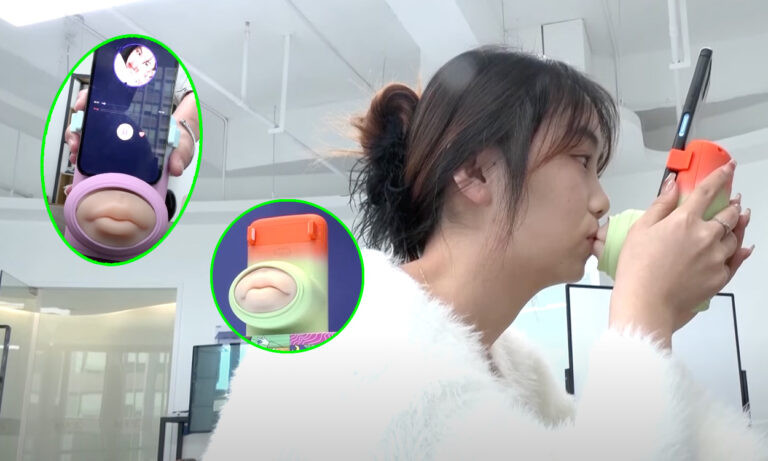Chinese startup invents kissing machine that lets you smooch your long-distance loved one

You’ve probably already heard of the rings, lamps, and pillows that light up or vibrate when one half of a long-distance relationship wants to show the other that they’re thinking about them, missing them or you know, in the mood for some extra kinky phone sex.
Now, there’s an even more intimate long-distance tech gadget on the market, one that’s sure to raise some eyebrows. Introducing MUA, a long-distance kissing machine that transmits users’ smooch data collected through motion sensors hidden in silicon lips, which simultaneously move when replaying kisses received. Hot stuff…
Named after the sound people make when blowing a kiss, the dystopian machine invented by the Chinese startup Siweifushe can also capture and replay sounds as well as warm up slightly during kissing sessions in order to make the experience that bit more authentic.
Imagined during one of the country’s strict COVID-19 lockdowns, which at some point saw residents unable to leave their home for months on end, the device also allows users to download kissing data submitted via an accompanying app by other users—because whether you are in a long-distance relationship or single as a Pringle, MUA does not discriminate.
“I was in a relationship back then, but I couldn’t meet my girlfriend due to lockdowns,” inventor Zhao Jianbo told The Guardian.
Being a student at the Beijing Film Academy at the time, he focused his graduate project on the lack of physical intimacy in video calls. He later went on to set up Siweifushe which released MUA on 22 January 2023. The kissing device is priced at 260 yuan (£31, $38).
In the two weeks after its release, the company sold an astonishing 3,000 kissing machines and received approximately 20,000 orders, the inventor stated.
Resembling a mobile stand with colourless pursed lips protruding from the front, MUA currently comes in several colours with the same unisex lips. To use it, users must download an app onto their smartphones and pair their kissing machines. Long story short, when they kiss the device, it kisses them back.
According to reviews on the Chinese online shopping platform Taobao, some customers seem pleased with the machine—with one user comparing it to “a warm pacifier”—while others were quick to point out how uncomfortable it made them feel.
“It doesn’t feel like a real kiss,” wrote one individual. Among the top complaints was its lack of tongue, which doesn’t feel like something that requires further explanation.
Another user, who revealed to be in a long-distance relationship, wrote: “In the past […] I could see her but I couldn’t touch her, but now there is a product that helps us to realise the kiss.” And honestly, no matter how uneasy this pair of perky but slightly childish-looking lips make most of us feel, if it can help people feel less alone, then why not?
As a final note for all the twisted and perverted out there, Zhao added that although his company complies with regulations, “there’s little we can do as for how people use the device,” if you know what I mean.





